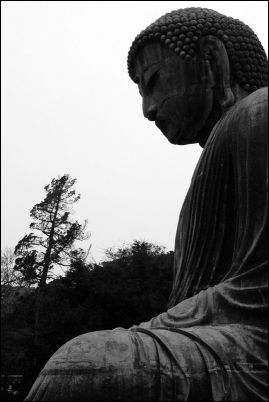
|
Japanese Zen Master Chen-kuan studied the doctrine of the Tien-tai School for six years, after which, he converted to the teachings of Ch'an. Having studied the teaching for seven years, Chen-kuan went to China and traveled for twelve years through famous mountains to visit Ch'an masters and to practice meditation. After being in the Ch'an School for more than twenty years, he finally perceived his true nature. He then packed his belongings and returned to his own country. In the cities of Kamakura and Nara, he disseminated the Ch'an teaching far and wide. Buddhists from all over came swarming to seek instruction and to practice meditation under his guidance. They all posed questions which were difficult for him to answer. These included:
Although he was asked many questions, Master Chen-kuan always kept his eyes closed and refused to answer even one of them. Some people knew that the Master did not like to discuss kung-ans with others. Hence, people discussed amongst themselves but did not improve their understanding of the kung-ans. One day, Master Tao-wen, who was a scholar from the Tien-tai School, went to visit Chen-kuan and paid his respect. Tao-wen was about fifty years old at the time and had been studying Tien-tai doctrine for more than thirty years. He told Chen-kuan with great sincerity, "I've studied the Lotus Sutra of the Tien-tai School ever since I was a child, but there's still one point I could never understand." Chen-kuan straightforwardly retorted, "The Lotus Sutra is complex and profound. It is comprehensive and flawless. People who read it are supposed to have many questions. Yet you only have one! What is your question?" Tao-wen declared, "It states in the Lotus Sutra: 'The sentient and the non-sentient will both attain prajna.' This implies that trees, grass, and flowers can all become Buddhas. Is this possible?" Chen-kuan replied, "Well, in the past thirty years, you've been worrying about whether trees, grass, and flowers can attain Buddhahood. What benefit will you get from knowing that? You should have concerned yourself with the question of whether you can become Buddha." Tao-wen was startled by this response. Finally, he said, "I've never thought of this question. May I ask, how can I become a Buddha?" Chen-kuan answered, "You said that you only had one question, so you'll have to answer the second question yourself."
(Source: Hsing Yun's Ch'an Talk, Book 3) |









